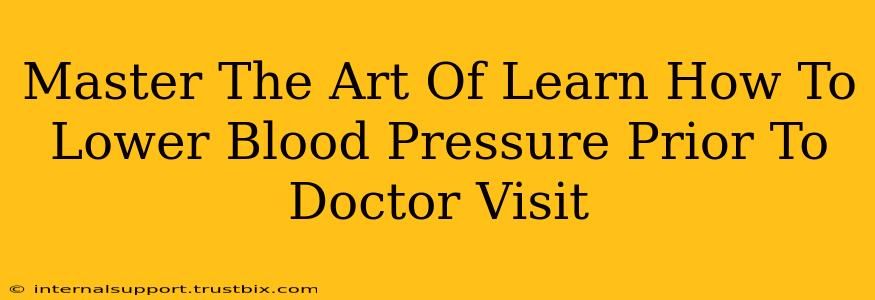Knowing how to lower blood pressure before a doctor's visit can significantly impact your appointment. A lower reading can lead to a more accurate assessment of your health, reduce anxiety, and potentially avoid unnecessary medication. This guide provides actionable strategies for achieving this, focusing on safe and effective methods. Remember, this information is for supplemental use and doesn't replace professional medical advice. Always consult your physician before making any significant changes to your health routine.
Understanding the Importance of Accurate Readings
High blood pressure, or hypertension, often requires consistent monitoring. However, temporary spikes caused by stress or anxiety before a doctor's visit can skew readings. This can lead to misdiagnosis or unnecessary treatment. By learning techniques to manage your blood pressure beforehand, you ensure a more reliable and representative measurement. This, in turn, allows your doctor to provide the best possible care.
Why Pre-Visit Blood Pressure Management Matters:
- More Accurate Diagnosis: A lower, more accurate reading provides a clearer picture of your typical blood pressure levels.
- Reduced Anxiety: Knowing you've taken steps to control your pressure can significantly reduce anxiety before the appointment.
- Avoid Unnecessary Medication: A falsely elevated reading might lead to unnecessary medication prescriptions. Managing your pressure beforehand helps to prevent this.
- Improved Doctor-Patient Communication: Accurate readings foster better communication and collaboration with your healthcare provider.
Proven Strategies to Lower Blood Pressure Before Your Appointment
The key is a multi-pronged approach incorporating lifestyle changes and relaxation techniques. Start implementing these strategies several days before your visit for optimal results.
Lifestyle Adjustments:
- Diet Modification: Avoid salty foods, processed meats, and excessive caffeine in the days leading up to your appointment. Focus on a diet rich in fruits, vegetables, and whole grains. This is a long-term strategy, but even short-term changes can make a difference.
- Hydration: Dehydration can elevate blood pressure. Ensure you are well-hydrated by drinking plenty of water in the days leading up to your visit.
- Physical Activity: Moderate exercise can lower blood pressure. A light walk or some gentle stretching the day before can be beneficial. Avoid strenuous activity immediately before your appointment, however.
- Sufficient Sleep: Aim for at least 7-8 hours of restful sleep each night. Sleep deprivation can negatively impact your blood pressure.
Relaxation Techniques:
- Deep Breathing Exercises: Practicing deep, controlled breathing can calm your nervous system and lower your blood pressure. Try this for 5-10 minutes before your appointment.
- Mindfulness Meditation: Mindfulness techniques help reduce stress and anxiety, both of which can elevate blood pressure. Even a short meditation session can make a difference.
- Progressive Muscle Relaxation: This technique involves systematically tensing and releasing different muscle groups to reduce muscle tension and promote relaxation.
The Day of Your Appointment:
- Avoid Stimulants: Refrain from caffeine and nicotine on the day of your appointment, as these can raise blood pressure.
- Relaxation Beforehand: Practice your chosen relaxation techniques shortly before your appointment to calm your nerves.
- Comfortable Environment: If possible, arrive early to allow yourself time to relax in a comfortable setting before your blood pressure is checked.
Important Considerations:
- Don't Overdo It: Avoid drastic measures to lower your blood pressure quickly. Focus on sustainable lifestyle changes.
- Consult Your Doctor: This information is for supplemental use only. Always discuss your blood pressure management plan with your doctor.
- Regular Monitoring: Regular blood pressure checks are crucial for long-term health management.
By following these strategies, you can significantly improve the accuracy of your blood pressure readings during your doctor's visit, leading to a more effective consultation and a more informed path towards better health. Remember that consistency is key—making these lifestyle changes a habit will contribute to better long-term blood pressure management.

